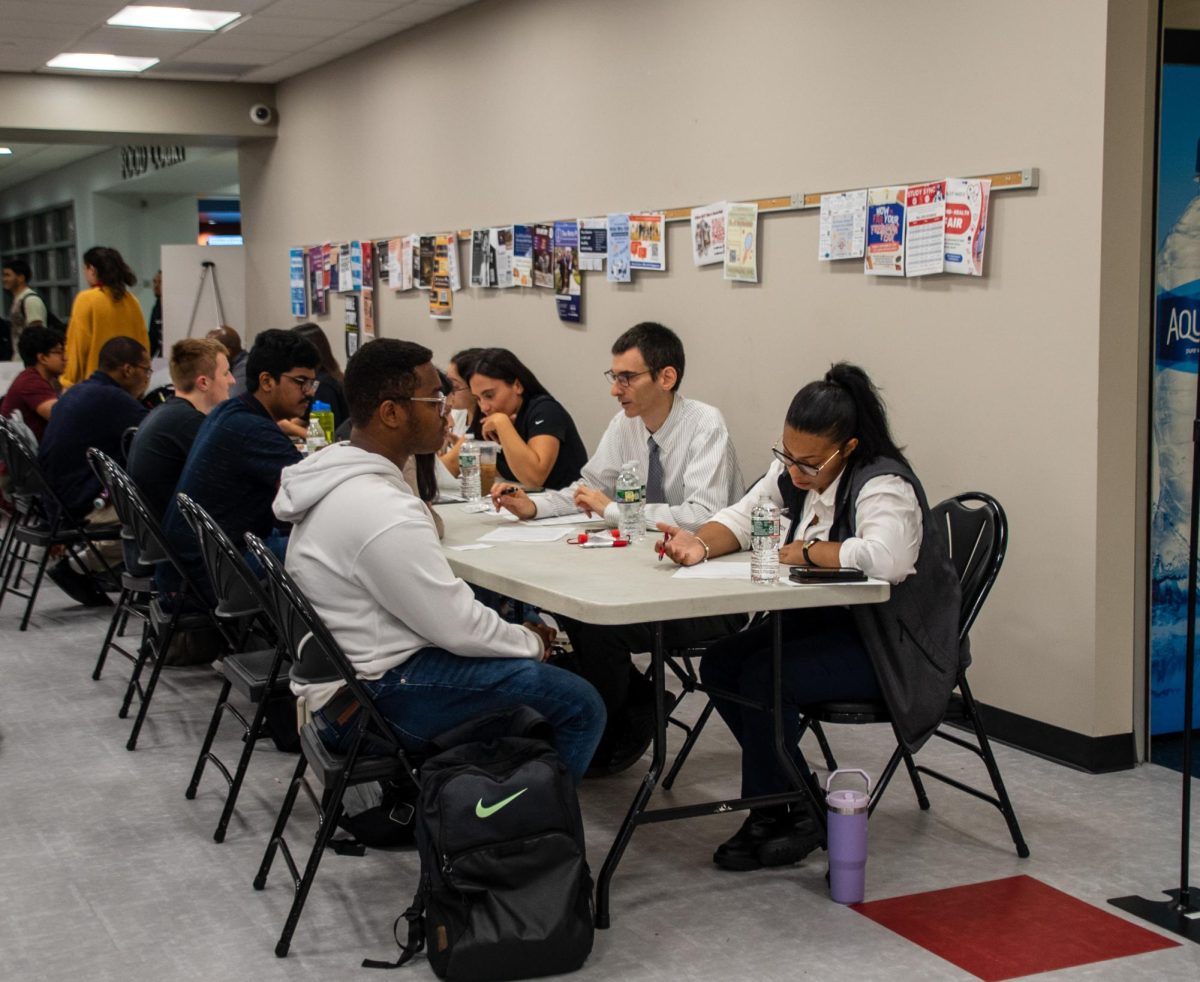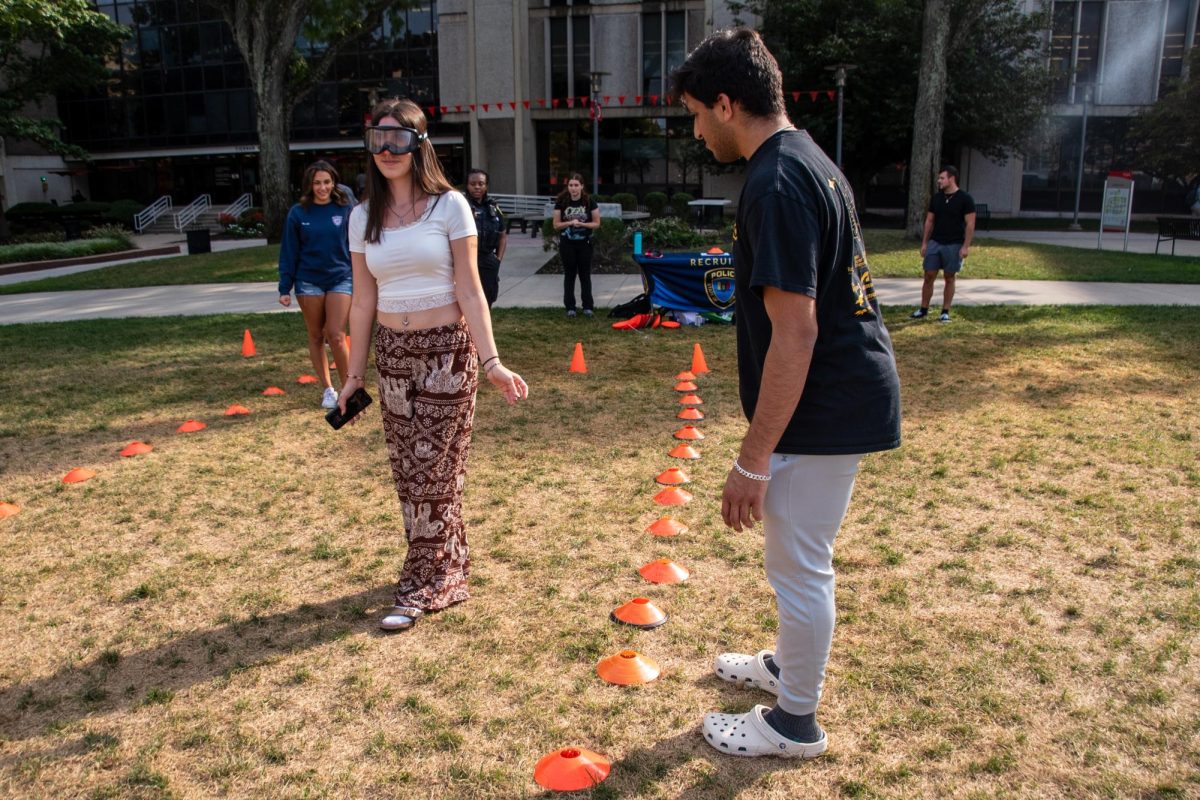Schools and universities all across the country have adapted to the routine of converged learning, attending classes online as well as in-person. NJIT has undoubtedly adjusted its classes as a safety measure in response to the pandemic. Various students were interviewed about their experiences with this type of learning in order to get more insight on how this environment may be affecting their education.
First year computer science major Ruby Kapoor has mostly converged classes, and she chooses to attend them all in-person if she can; this is how she makes them feel as “normal” as possible. Even with this arrangement, she said, “I do wish exams had better formatting since those are required to be online.”
This learning structure has accordingly given students more freedom in their choices; Kapoor mentioned that the “easiest part is being able to choose when you want to go in person and when you want to be online, which works really well with my weekends when I want to go home and just do my Friday classes remotely.” First year biology major Joseph Ayoub also remarked that the “easiest part of converged learning is that it is really simple to get on class even if you just woke up.”
However, while freshman biology major Jeffrey Luk finds it being able to do work completely on his own extremely feasible, “the hardest part is concentrating,” as students are more likely to have some form of diversions around them if they do not physically go to class. Reinforcing this point, second year computer science and applied mathematics double major Grace Leverett commented, “When I’m sitting in my dorm behind my laptop, there are so many things to distract me that I don’t pay as much attention, and I end up doing other things.”
Despite that, this idea does not resonate with Dean Johnson, a freshman undecided engineering major, who is entirely virtual this semester: “Many people think staying at home can be a distraction, but I make sure to always focus during class, so that isn’t a problem either.” He believes that the most difficult part “is probably the tests because I have that lurking feeling of being watched (because I am being watched), and it makes me more nervous.”
When asked about which types of classes work better online than others, students had conflicting responses. Kapoor believes that “math and science classes definitely work better in person because concepts are harder to grasp, but humanities classes like English can be done online with no problem because they are less concepts and understanding based.” On the other hand, first year biology major Aashna Patel thinks that “certain classes like humanities work better in person because there is more interaction and discussion involved. Other classes like biology and chemistry work well online since the professors lecture for the most part.”
Virtual exams certainly seem to be quite troublesome for most, but online learning has also greatly affected the participation level for many students. Kapoor mentioned that “I feel significantly less motivated to participate in online learning because it feels very impersonal just talking to a black screen with everyone else on mute and no images.” With her computer science class, however, “since it is small, I do participate and ask questions more because it seems more interactive… like our professor cares.” In terms of interaction, Patel recognizes that “even when the professor tries to get us engaged through breakout sessions, it’s not the same as being in the same room” physically. Leverett reasoned her decreased motivation as the fact that classes “don’t feel 100% real.” Many others who were interviewed thought similarly; Kapoor said, “I also feel that since I am not going in person, it isn’t an actual class.”
Unaffected by his home setting, Johnson said, “I am okay with participating in large classes and small classes alike because I am often the only one un-muting my microphone to talk, so the chances I get interrupted are pretty slim, and being at home makes it easier to correct the professor’s mistakes without being embarrassed.”
Another crucial concern for students is the organization of tasks to be submitted. Leverett talked about how she keeps up with her tasks, similar to what others do as well: “I use a third party planner website to keep track of my assignments, so as soon as my professors assign something I just put it in there, but if I didn’t use it, keeping track of all of my assignments on Canvas would be a nightmare. Not all of my assignments are actually logged under ‘assignments’ on Canvas, and not all my professors put in due dates; they just tell us to remember them, so it can be difficult to keep track of things if you’re not using a planner or calendar or something else other than Canvas.” Patel pointed out that “there are numerous different places that professors assign work, whether that is Canvas, a textbook or MyMathLab for calculus.”
When students have questions about their work for class or just need to reach out to classmates, it has been a little more difficult because an online learning platform doesn’t allow side conversations during class as easily. Kapoor reflected that “Sometimes it has been hard to connect with other classmates if I have questions [about] homework, but GroupMe has been a godsend for that.” Johnson also commented that Instagram, Snapchat and Discord have been some of the more popular platforms to get into contact with fellow students.
Architecture students have a much more streamlined course of study, typically going to studio for the majority of their college experience. Third year student Lucas Konrad-Parisi explained how it has been substantially altered this year: “For architecture students like me, online classes have been a pretty big shift. My studio classes, which used to be all about the in-person experience, are now completely digital. We don’t need to worry about prints or physical models anymore- which takes a large burden off the shoulders of every architecture student.”
Fourth year digital design major Kaylin Wittmeyer gave a detailed description of her transition to online learning for her course of study. “The only thing that has really changed about studio is working and learning outside of our 12 hours of class a week,” she said. “Class time usually centers around theoretical artistic discussions and critiques of work; it is up to us to learn methodologies and programs and do all the work outside of class time. Because of this, we usually learn our programs and techniques through a combination of [watching] YouTube videos and engaging with other students and upperclassmen.”
She added, “That is the part that is hardest right now; it is infinitely harder to ask questions and learn new techniques or be inspired by your classmates because we can’t walk studio to studio at 10 PM to see what everyone is working on. Even simple questions (e.g. where is this button, how do I stop this glitch, what’s the command for, etc.) could take half an hour or more to answer, when in studio, it usually only takes asking the person next to you. I think I spend an extra 5-10 hours a day on FaceTime or Discord for this reason.”
Even though she has had to adapt to many changes in her courses, Wittmeyer has seen a lot of positives during this situation in terms of being productive and furthering her educational opportunities: “I also have a lot more time to work on my portfolio, and I have actually joined many online groups to help with my professional artistic development. I joined a storyboarding club at one of the most famous art schools in the world because their meetings are on Discord, and they started posting the links on Twitter, so I get to learn from them and interact with professionals that they bring in.”
Evidently, students of all years and majors are experiencing challenges with this semester’s converged and online classrooms, but luckily most do not feel completely alone despite a more remote semester.

































